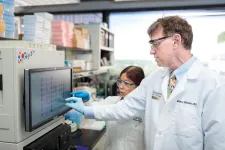(Press-News.org) Lancaster University researchers investigating consumer attitudes and behaviours around plastic food packaging have found UK households are ‘wishcycling’ rather than recycling – and say it’s a problem that everyone - government, food producers, waste management and residents – has to solve.
Wishcycling – the act of putting packaging in recycling bins and hoping for the best, rather than knowing it’s recyclable – is something households are doing due to confusing product labels and differing recycling facilities around the country, experts warn.
The academics behind Lancaster University’s Plastic Packaging in People’s Lives (PPiPL) project have been working hand-in-hand with supermarkets, businesses, charities and waste management companies for the last 3.5 years to explore the ins and outs of how the UK thinks and acts when it comes to plastic food packaging.
Today, a suite of reports is published to highlight their findings, offering recommendations to help reduce the UK’s plastic usage and contribute towards the UK’s Plastics Pact goals. A total of 552 people and 91 organisations were involved in the research via interviews with consumers and households, workshops, supply chain companies and waste management facility visits.
“We have studied the plastic packaging cycle – from the moment plastic is made through to how it is used by suppliers, experienced by customers and then treated in the waste process, to get a full picture of the UK’s attitudes and behaviours towards plastic food packaging,” Lancaster University’s Professor Maria Piacentini, Co-Principal Investigator of the PPiPL project explains.
“Our results suggest some UK households really care about the planet and try their best, but reducing food waste in their homes is as much a priority as minimising plastic – and can sometimes trump concerns over packaging.
“We also find a reluctance to wash and recycle some packaging through fears of contamination – for instance from raw meat or fish packets. Residents are more likely to throw this sort of recyclable waste into the normal bin or contaminate their household recycling by not washing the containers, which can cause far greater contamination further on in the recycling process. This is important for policymakers to understand if we are to achieve the ambitions set out in the UK Plastics Pact.”
The study also finds people tend to guess whether food packaging is recyclable from how the packet feels, rather than studying the container to determine whether it is recyclable and accepted by their local council due to confusion around packaging labels and symbols.
“The inconsistency in waste collection services across UK councils is still complicating matters, as we can encounter different waste and recycling facilities at home, work and when we are out and about,” Dr Alison Stowell, co-principal investigator for the PPiPL project adds. “If the UK fulfils its ambitions for a ‘simpler, common-sense approach’ to recycling through standardisation of bin collection services, and food producers worked with On-Pack Recycling Label (OPRL) to create uniform labelling, recycling could be a lot less confusing and more effective for us all.”
As part of the project, members of the PPiPL academic team also embedded themselves in two separate businesses for between 3-6 months to fully explore the use of plastic in the firms and their supply chains, as well as understand customer demands and experiment with alternative plastic packaging. As a result of the project, one of the firms re-wrote its specifications for its own supply chains, to transport more food in bulk and reduce the amount of plastic used in transportation.
The experimentation with alternative packaging uncovered a variety of issues and highlighted the strengths and value of plastic for food safety and transportation. Meanwhile, supply chain research uncovered the environmental challenges posted by alternative food packaging due to the lack of waste management infrastructure set up to recycle these on a grand scale.
The team also ran a pilot project with Booths supermarket, to ‘live’ test their research findings on consumers.
Dr Stowell explains: “We discovered some supply chain firms believed customers would reject packaging made from some recycled plastics due to imperfections or flecks in the containers which they thought customers would find off-putting. The dynamic element of our research enabled us to put this perception to the test, so we went and tested it out with customers in a large supermarket – and found this to be largely untrue.”
The new suite of reports outline the in-depth findings of the project and intend to help steer consumers, retailers, suppliers, waste management as well as policymakers at a local and national level towards collective solutions to the pinch points that inhibit the drive towards the more effective use of plastic and cleaner, greener growth.
Among their recommendations, experts reinforce the need for:
Supporting pre-competitive spaces where organisations involved in the circular food supply chain can work together to share problems and best practice to help drive innovation in sustainable packaging
The ‘simpler, common-sense approach’ to recycling requiring uniformity in recycling collections and facilities to ease confusion
Producers and brands to design packaging using texture or colour to make packaging more noticeable to consumers
Customers to pay greater attention to the food packaging they purchase
Residents to sort, wash and squash their household recycling to save space, reduce the carbon footprint in transit and increase opportunities for secondary use
Households to regularly check their local council’s guidelines and prevent contamination via ‘wishcycling’
The concerns and recommendations raised in the reports are now being shared with supply chains, waste management, councils and government in the hope that changes can be made to make recycling easier for consumers. The PPiPL team are also using their research to develop a new initiative called ‘In the Loop’ to facilitate communication between Booth supermarket, their customers, and Lancaster City Council (LCC) on several interconnected issues, including recycling, plastic packaging circularity, and food packaging innovations.
PPiPL’s multi-disciplinary research team is comprised of Lancaster University experts in consumer insights, supply chain management, waste management and material science. The team includes Dr Alison Stowell, Professor Maria Piacentini, Dr Charlotte Hadley, Dr Clare Mumford, Professor James Cronin, Marta Ferri, Dr John Hardy, Professor Linda Hendry, Dr Harris Kaloudis, Dr Ghadafi Razak, Professor Alex Skandalis and Dr Savita Verma.
PPiPL’s industry partners include Preston Plastics, Institute of Materials, Minerals and Mining, Waitrose, Booths, Butlers Cheeses, Bells of Lazonby, Lancaster City Council, Biotech services, Suez, Chartered Institution of Wastes Management.
ENDS
Notes to Editors
The project is part of a Natural Environment Research Council research programme, funded by UKRI’s Smart Sustainable Plastic Packaging Challenge. Delivered by Innovate UK, it aims to address known problems and knowledge gaps in relation to plastic packaging and work with stakeholders from across the supply chain.
About the Smart Sustainable Plastic Packaging Challenge
With a portfolio of over 80 funded projects, the SSPP challenge is the largest and most ambitious UK government investment to date in sustainable plastics research and innovation, driving cleaner growth across the UK’s plastics, packaging and retail supply chains. The aim of the Challenge is to establish the UK as a leading innovator in smart and sustainable plastic packaging, driving cleaner growth across the supply chain, and supporting a significant reduction in plastic waste entering the environment by 2025.
END
Research into UK’s use of plastic packaging finds households ‘wishcycle’ rather than recycle – risking vast contamination
Lancaster University researchers investigating consumer attitudes and behaviours around plastic food packaging have found UK households are ‘wishcycling’ rather than recycling – and say it’s a problem everyone has to solve
2024-11-14
ELSE PRESS RELEASES FROM THIS DATE:
Vaccine shows promise against aggressive breast cancer
2024-11-14
A small clinical trial shows promising results for patients with triple-negative breast cancer who received an investigational vaccine designed to prevent recurrence of tumors. Conducted at Washington University School of Medicine in St. Louis with a therapy designed by WashU Medicine researchers, the trial is the first to report results for this type of vaccine — known as a neoantigen DNA vaccine — for breast cancer patients.
The study, which found the vaccine to be well-tolerated and to stimulate ...
Adverse events affect over 1 in 3 surgery patients, US study finds
2024-11-14
Adverse events affect more than a third (38%) of adults undergoing surgery, finds a study of admissions to 11 hospitals in the US state of Massachusetts, published by The BMJ today.
Of the 1009 admissions analysed, nearly half were classified as major (resulting in serious, life threatening or fatal harm) and the majority were considered as potentially preventable.
Although this study may not fully represent hospitals at large, the findings show that “adverse events remain widespread in contemporary ...
Outsourcing adult social care has contributed to England’s care crisis, argue experts
2024-11-14
Outsourcing adult social care services in England to the private sector since the 1980s has led to worse care and should be rolled back, argue experts in The BMJ today.
Benjamin Goodair at the Blavatnik School of Government, University of Oxford and colleagues suggest that removing the profit motive would help improve quality and reduce inequities.
Social care, sometimes referred to as community, residential, or personalised care, for older people and people with physical and mental disabilities is facing record demand but performing worse than any time in recent history, they explain.
One contributor to this, they say, is the outsourcing of care provision from the ...
The Lancet: Over 800 million adults living with diabetes, more than half not receiving treatment, global study suggests
2024-11-14
**Correction**
A subheading in the press release sent yesterday was incorrect - the line 'Global rates of diabetes doubled over the last two decades' should be ''Global rates of diabetes doubled over the last three decades'.
The subheading and two further occurrences of the same mistake have been corrected in the copy below (in yellow). The rest of the press release remains unchanged.
We sincerely apologise for any inconvenience caused,
The Lancet press office (pressoffice@lancet.com).
The ...
New therapeutic approach for severe COVID-19: faster recovery and reduction in mortality
2024-11-14
A new clinical study shows that an inhibitor of Fas ligand (FasL), also called CD95 ligand (CD95L), led to a faster recovery of COVID-19 patients and reduced mortality. On average, it took eight days to recover for patients who received asunercept, a biotherapeutic FasL inhibitor, compared to 13 days in the control group. In addition, mortality was decreased by about 20 per cent. The study ‘Efficacy and safety of asunercept, a CD95L-selective inhibitor, in hospitalised patients with moderate-to-severe COVID-19: ASUNCTIS, a multicentre, randomised, open-label, controlled, phase 2 trial’ ...
Plugged wells and reduced injection lower induced earthquake rates in Oklahoma
2024-11-14
Wastewater injection resulting from oil and gas production in Oklahoma caused a dramatic rise in seismic activity in the state between 2009 and 2015. But regulatory efforts to backfill some injection wells with cement and reduce injection volumes have been effective in lowering the state’s induced earthquake rate, according to a new study in The Seismic Record.
The study by Robert Skoumal of the U.S. Geological Survey and colleagues lends further support to the idea that reducing the depth of wastewater injection can decrease seismic activity—a finding that ...
Yin selected as a 2024 American Society of Agronomy Fellow
2024-11-14
Frank Yin, agronomy researcher in the University of Tennessee Department of Plant Sciences, has been selected as a 2024 American Society of Agronomy (ASA) Fellow.
The honor was awarded as a result of Yin’s more than 35 years of research contributions to institutions across the world, including 16 years at the University of Tennessee Institute of Agriculture (UTIA). Yin was recognized for the Fellowship at the national meeting of ASA in San Antonio, Texas in November.
“I am humbled and honored to receive this distinction, but above all I am ...
Long Covid could cost the economy billions every year
2024-11-14
Working days lost to long Covid could be costing the economy billions of pounds every year as patients struggle to cope with symptoms and return to work, finds a new study led by UCL researchers.
The research, published in BMJ Open and funded by the National Institute for Health and Care Research (NIHR), examined the impact of long Covid on 4,087 patients who were referred to a long Covid clinic and registered in the Living With Covid Recovery (LWCR) programme between August 2020 and August 2022.
As part of their NHS treatment for the condition, the patients ...
Bluetooth technology unlocks urban animal secrets
2024-11-13
Mobile phones could be the key to a cheaper and more reliable way of tracking animals for ecology and conservation research, according to a new study from The Australian National University (ANU).
Traditional animal tracking methods are often expensive and require the tagged animals to be close to the tracking technology.
Now, ANU researchers have developed a cheap, lightweight Bluetooth beacon that can provide regular updates through our network of mobile phones in areas used by people carrying phones or smartwatches.
Study lead author and ANU ecologist, ...
This nifty AI tool helps neurosurgeons find sneaky cancer cells
2024-11-13
FOR IMMEDIATE RELEASE
Media Contact: Suzanne.Leigh@ucsf.edu, (415) 680-5133
Subscribe to UCSF News
This Nifty AI Tool Helps Neurosurgeons Find Sneaky Cancer Cells
Technique offers new hope for increased survival in patients with brain tumors.
What’s New:
An AI-based diagnostic system reveals cancerous tissue that may not otherwise be visible during brain tumor surgery. This enables neurosurgeons to remove it while the patient is still under anesthesia – or treat it afterwards with targeted therapies.
Why it Matters:
Brain tumors can ...
LAST 30 PRESS RELEASES:
Korea University, Stanford University, and IESGA launch Water Sustainability Index to combat ESG greenwashing
Molecular glue discovery: large scale instead of lucky strike
Insulin resistance predictor highlights cancer connection
Explaining next-generation solar cells
Slippery ions create a smoother path to blue energy
Magnetic resonance imaging opens the door to better treatments for underdiagnosed atypical Parkinsonisms
National poll finds gaps in community preparedness for teen cardiac emergencies
One strategy to block both drug-resistant bacteria and influenza: new broad-spectrum infection prevention approach validated
Survey: 3 in 4 skip physical therapy homework, stunting progress
College students who spend hours on social media are more likely to be lonely – national US study
Evidence behind intermittent fasting for weight loss fails to match hype
How AI tools like DeepSeek are transforming emotional and mental health care of Chinese youth
Study finds link between sugary drinks and anxiety in young people
Scientists show how to predict world’s deadly scorpion hotspots
ASU researchers to lead AAAS panel on water insecurity in the United States
ASU professor Anne Stone to present at AAAS Conference in Phoenix on ancient origins of modern disease
Proposals for exploring viruses and skin as the next experimental quantum frontiers share US$30,000 science award
ASU researchers showcase scalable tech solutions for older adults living alone with cognitive decline at AAAS 2026
Scientists identify smooth regional trends in fruit fly survival strategies
Antipathy toward snakes? Your parents likely talked you into that at an early age
Sylvester Cancer Tip Sheet for Feb. 2026
Online exposure to medical misinformation concentrated among older adults
Telehealth improves access to genetic services for adult survivors of childhood cancers
Outdated mortality benchmarks risk missing early signs of famine and delay recognizing mass starvation
Newly discovered bacterium converts carbon dioxide into chemicals using electricity
Flipping and reversing mini-proteins could improve disease treatment
Scientists reveal major hidden source of atmospheric nitrogen pollution in fragile lake basin
Biochar emerges as a powerful tool for soil carbon neutrality and climate mitigation
Tiny cell messengers show big promise for safer protein and gene delivery
AMS releases statement regarding the decision to rescind EPA’s 2009 Endangerment Finding
[Press-News.org] Research into UK’s use of plastic packaging finds households ‘wishcycle’ rather than recycle – risking vast contaminationLancaster University researchers investigating consumer attitudes and behaviours around plastic food packaging have found UK households are ‘wishcycling’ rather than recycling – and say it’s a problem everyone has to solve


